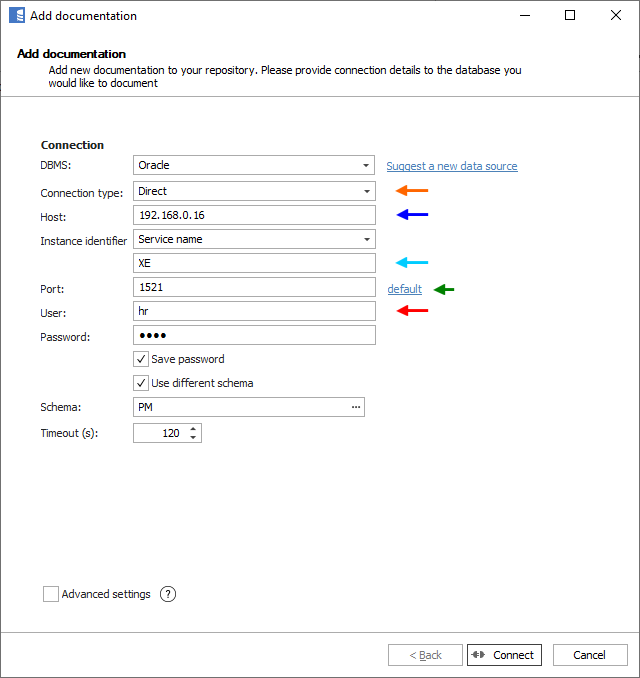Catalog and documentation
Data catalog
Dataedo documents metadata of following objects:
- Tables
- Views
- Materialized views
- Procedures
- Packages
- Functions
- Sequences
- Jobs
For more details, go to Connector specification section
Descriptions, aliases and custom fields
When technical metadata is imported users will be able to edit descriptions of each object and element, provide meaningful aliases (titles) and document everyting with additional custom fields.
Import and export comments
When importing metadata from Oracle, Dataedo reads table, view and column comments.
Business Glossary
Users will be able to link a Business Glossary term to any Oracle object.
Table relationships and keys
Dataedo imports table relationships (foreign keys), primary and unique keys with their columns.
ER Diagrams
Using imported and manually created foreign keys Dataedo allows you to create your own ER diagrams (ERDs) manually.
Data Profiling
Users will be able to run data profiling for a table, view or materialized view, then save selected data in the repository. This data will be available from Desktop and Web. Profiling requires Select Permission over profiled object.
Lookups / Reference data
Users will be able to build Lookups for columns in Oracle tables and views and feed them with distinct values from a column.
Data Classification
Users will be able to run classification on Snowflake database in the repository in serach of columns containing potentially sensitive data. All built in functions are supported.
Importing changes and schema change tracking
Changes to descriptions in Dataedo Desktop and Web Catalog are tracked and saved in the repository.
Description changes
Changes to descriptions in Dataedo Desktop and Web Catalog are tracked and saved in the repository. Users are able to manually edit object description.
Share in Web Catalog or export to HTML, PDF or Excel
Documentations can be exported by sharing it in web catalog or generating HTML, PDF or Excel.
Subject areas
Users can mannually create multiple ERDs in subject areas, as a diagram of whole database or only part of it.
How to Connect
- Connection type -choose connection type (Direct or Oracle client )
- Host - provide a host name or address where a database is on. E.g. server17, server17.ourdomain.com or 192.168.0.37.
- Service name - type in Oracle instance Service name
- Port - type in Oracle instance port name
- User and password - provide your username and password
- Schema - you can choose schema(s) that you want to import to your documentation

Connector specification
Supported versions
Oracle 9i R1, 9i R2, 10g R1, 10g R2, 11g R1, 11g R2, 12c R1, 12c R2, 18c, 19c, 21c, 23c.
Supported editions
Express, Standard and Enterprise.
Imported objects
| Object | Imported as |
|---|---|
| Table | Table |
| View | View |
| Materialized view | View |
| Procedure | Procedure |
| Package | Package |
| Function | Function |
| Sequence | Sequence |
| Job | Task/Job |
Imported metadata
| Imported | Editable | |
|---|---|---|
| Tables | ✅ | ✅ |
| Columns | ✅ | ✅ |
| Data types | ✅ | |
| Nullability | ✅ | |
| Column comments | ✅ | ✅ |
| Table comments | ✅ | ✅ |
| Foreign keys | ✅ | ✅ |
| Primary keys | ✅ | ✅ |
| Unique keys | ✅ | ✅ |
| Triggers | ✅ | |
| Views, Materialized Views | ✅ | ✅ |
| Script | ✅ | ✅ |
| Columns | ✅ | ✅ |
| Data types | ✅ | |
| Column comments | ✅ | ✅ |
| View comments | ✅ | ✅ |
| Procedures, Cubes | ✅ | ✅ |
| Script | ✅ | ✅ |
| Parameters | ✅ | |
| User-defined Functions | ✅ | ✅ |
| Script | ✅ | ✅ |
| Input arguments | ✅ | |
| Output results | ✅ | |
| Function comments | ✅ | ✅ |
| Sequences | ✅ | ✅ |
| Sequence comments | ✅ | ✅ |
| Jobs | ✅ | ✅ |
| Job definition | ✅ | |
| Job comments | ✅ | ✅ |
| Parameters | ✅ | |
| Data types | ✅ |
Supported features
| Feature | Imported |
|---|---|
| Import comments | ✅ |
| Write comments back | ✅ |
| Data profiling | ✅ |
| Reference data (import lookups) | ✅ |
| Importing from DDL | ✅ |
| Generating DDL | ✅ |
| FK relationship tester | ✅ |
| Writing back comments | ✅ |
Comments
Dataedo reads comments from following Oracle objects:
| Object | Read | Write back |
|---|---|---|
| Table comments | ✅ | ✅ |
| Column comments | ✅ | ✅ |
| View comments | ✅ | ✅ |
| Columns | ✅ | ✅ |
| Procedures and Cubes comments | ✅ | ✅ |
| Function comments | ✅ | ✅ |
| Sequence comments | ✅ | |
| Job comments | ✅ |
Data profiling
Datedo supports following data profiling in Oracle:
| Profile | Support |
|---|---|
| Table row count | ✅ |
| Table sample data | ✅ |
| Column distribution (unique, non-unique, null, empty values) | ✅ |
| Min, max values | ✅ |
| Average | ✅ |
| Variance | ✅ |
| Standard deviation | ✅ |
| Min-max span | ✅ |
| Number of distinct values | ✅ |
| Top 10/100/1000 values | ✅ |
| 10 random values | ✅ |
Read more about profiling in a Data Profliling documentation.
Data Lineage
| Source | Method | Version |
|---|---|---|
| Views - object level | From dependencies | ✅ |
| Views - object level | From SQL parsing | ✅ |
| Views - column level | From SQL parsing | ✅ |
Required access level
Importing database objects requires certain access level in documented database. User specified in "Import objects from database" window should at least have "Connect" role, and "Create session" system privilege.
Importing objects definition from different schema requires either SELECT_ANY_DICTIONARY (recommended) or SELECT permission on any table, view and Execute on any procedure, function, sequence and job that are to be documented.
No data is altered in source database during a synchronization process.
Following objects are accessed during schema import process:
- all_constraints
- all_cons_columns
- all_objects
- all_tab_columns
- all_tab_comments
- ALL_ARGUMENTS
- ALL_CONSTRAINTS
- ALL_CONS_COLUMNS
- ALL_INDEXES
- ALL_IND_COLUMNS
- ALL_SOURCE
- ALL_TRIGGERS
- ALL_SEQUENCES
- ALL_SCHEDULER_JOBS
- dual
Known issues and limitations
Following schema elements currently are not supported:











 Wojtek Bialek
Wojtek Bialek